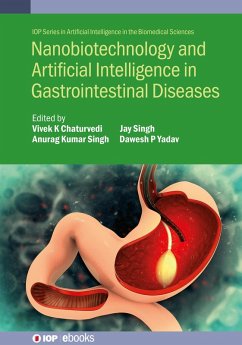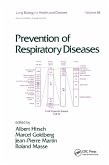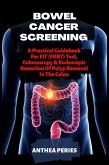Nanotechnology and Artificial Intelligence (AI) have the potential to transform the existing treatment and diagnostic choices for gastrointestinal disorders. Several recent studies have shown that gastrointestinal diseases can be diagnosed at a critically earlier stage and treated successfully using nanomaterials associated AI applications. The Gastrointestinal (GI) tract is a considerable target system for nanotechnology and AI, as it contains a wide variety of substances, such as water, nutrients, and/or therapeutics that are absorbed within it. Nanotechnology with AI is anticipated to have a significant impact on how gastroenterological disorders are diagnosed and treated in terms of effectiveness, dependability, and practicality. The essential aspect of AI based nanomedicine is 'drug delivery', which is one of the most exciting applications of nanobiotechnology, which can manipulate molecules and supramolecular structures to make devices with pre-programmed functionality. The present drug delivery methods are divided into nano and microscale systems, which primarily make use of nanoparticles, liposomes. Polymeric micelles (nanovehicles), dendrimers, nanocrystals, microchips and other innovative microparticles. Future advancements in these technologies will create effective nano/micro drug delivery systems that will meet healthcare challenges for the detection and treatment of a number of highly significant gastrointestinal disorders.
This book is broadly focused on recent developments in nanotechnology and artificial intelligence-based drug delivery systems, diagnosis, and the role of various nanomaterials in the management of gastrointestinal diseases, such as abdominal pain, bowel obstruction, diarrhoea, pancreatitis, celiac disease, intestinal tuberculosis and stomach cancer. It's hoped that this work will provide a comprehensive resource for clinicians, scientists, and researchers in a variety of fields such as gastroenterology, biotechnology, nanotechnology, pharmaceutical biotechnology, pharmacology, pharmaceuticals, nanomedicine, tissue engineering and biomaterials.
This book is broadly focused on recent developments in nanotechnology and artificial intelligence-based drug delivery systems, diagnosis, and the role of various nanomaterials in the management of gastrointestinal diseases, such as abdominal pain, bowel obstruction, diarrhoea, pancreatitis, celiac disease, intestinal tuberculosis and stomach cancer. It's hoped that this work will provide a comprehensive resource for clinicians, scientists, and researchers in a variety of fields such as gastroenterology, biotechnology, nanotechnology, pharmaceutical biotechnology, pharmacology, pharmaceuticals, nanomedicine, tissue engineering and biomaterials.
Dieser Download kann aus rechtlichen Gründen nur mit Rechnungsadresse in A, D ausgeliefert werden.









